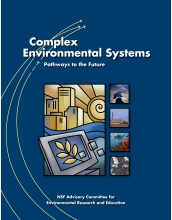|

Press Release 05-056
NSF Releases "Pathways to the Future" Environment Report

Research on human and natural-system links called integral
April 13, 2005
Accelerating environmental changes have presented humanity with significant scientific and engineering challenges, according to the new National Science Foundation (NSF) report, Pathways to the Future: Complex Environmental Systems: Synthesis for Earth, Life and Society in the 21st Century.
The changes the report cites are rapid shifts in climate and ecosystems, the degradation of freshwater resources, global spreading of diseases, and the increasing threat of biological and chemical terrorism. Among the research challenges are the need to understand how and why these changes are occurring—especially when multiple stresses are acting on environmental systems simultaneously—and how best to respond to them.
"Now more than ever," write the members of the NSF Advisory Committee for Environmental Research and Education (ACERE), who authored the report, "scientists must address combinations of factors in their research, such as the interactions between human activities and natural cycles at different spatial and temporal scales."
The report encourages NSF to maintain its foundation-wide emphasis on investigations of coupled human and natural systems, as currently embodied in the Biocomplexity in the Environment program, and discusses related goals.
"Environmental research and education should remain on the forefront of science funding," said David Skole, a geographer at Michigan State University and ACERE chair. "This document is an attempt to address the future of the ERE portfolio at NSF in these budget-constrained times, while continuing to stimulate this important research. A main focal point is research on coupled human and natural systems, which is integral to understanding our environment."
The report also focuses on water as a complex environmental system. "All human and natural systems are influenced by the distribution, abundance, quality and accessibility of water," it says. With continued human population growth and the uncertain impacts of environmental change, the report states, ensuring an adequate quantity and quality of freshwater for sustaining all forms of life is a growing challenge. "Integrated, multidisciplinary, and multi-scale water-related research is necessary for meeting the challenge."
The authors recommend that NSF focus on water as a unifying theme for research on complex environmental systems. Because water is a critical resource whose availability strongly impacts human health and economic development, this research will advance scientific understanding while addressing urgent societal issues, the report states. "The results could then be applied to other potential focus areas for research on complex environmental systems, such as land use, energy and climate."
-NSF-

Media Contacts
Cheryl L. Dybas, NSF (703) 292-7734 cdybas@nsf.gov
Related Websites
Pathways report in PDF format: http://www.nsf.gov/geo/ere/ereweb/ac-ere/acere_pathways.pdf

The National Science Foundation (NSF) is an independent federal agency that supports fundamental research and education across all fields of science and engineering. In fiscal year (FY) 2009, its budget is $9.5 billion, which includes $3.0 billion provided through the American Recovery and Reinvestment Act. NSF funds reach all 50 states through grants to over 1,900 universities and institutions. Each year, NSF receives about 44,400 competitive requests for funding, and makes over 11,500 new funding awards. NSF also awards over $400 million in professional and service contracts yearly.
 Get News Updates by Email Get News Updates by Email
Useful NSF Web Sites:
NSF Home Page: http://www.nsf.gov
NSF News: http://www.nsf.gov/news/
For the News Media: http://www.nsf.gov/news/newsroom.jsp
Science and Engineering Statistics: http://www.nsf.gov/statistics/
Awards Searches: http://www.nsf.gov/awardsearch/
| 

